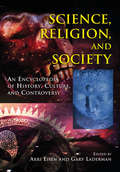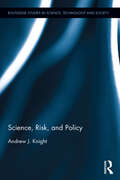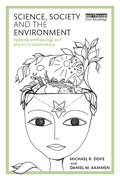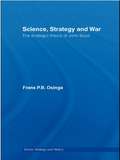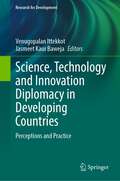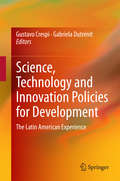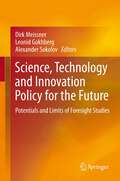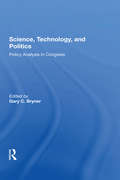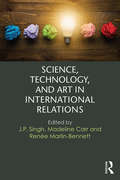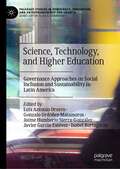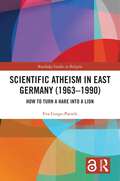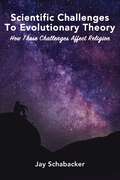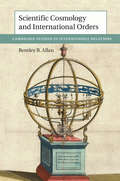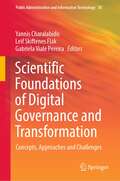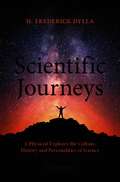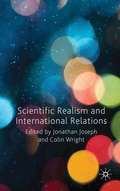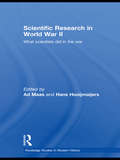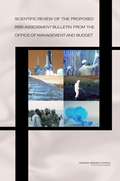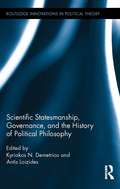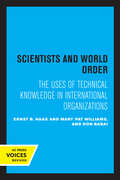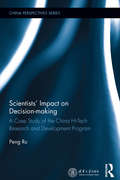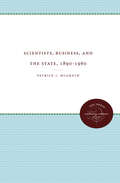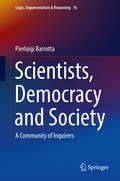- Table View
- List View
Science, Religion and Society: An Encyclopedia of History, Culture, and Controversy
by Gary Laderman Arri EisenThis unique encyclopedia explores the historical and contemporary controversies between science and religion. It is designed to offer multicultural and multi-religious views, and provide wide-ranging perspectives. "Science, Religion, and Society" covers all aspects of the religion and science dichotomy, from humanities to social sciences to natural sciences, and includes articles by theologians, religion scholars, physicians, scientists, historians, and psychologists, among others. The first section, General Overviews, contains essays that provide a road map for exploring the major challenges and questions in science and religion. Following this, the Historical Perspectives section grounds these major questions in the past, and demonstrates how they have developed into the six broad areas of contemporary research and discussion that follow. These sections - Creation, the Cosmos, and Origins of the Universe; Ecology, Evolution, and the Natural World; Consciousness, Mind, and the Brain; Healers and Healing; Dying and Death; and Genetics and Religion - organize the questions and research that are the foundation of the enormous interest, and controversy, in science and religion today.
Science, Risk, and Policy (Routledge Studies in Science, Technology and Society #32)
by Andrew J. KnightFor decades, experts and the public have been at odds over the nature and magnitude of risks and how they should be mitigated through policy. Experts argue that the fears of the public are irrational, and that public policy should be based on sound science. The public, on the other hand, is skeptical of experts, and believe policy should represent their interests. How do policy analysts make sense of these competing views? Science, Risk and Policy answers this question by examining how people evaluate evidence, how science is conducted, and how a multi-disciplinary framework to risk can inform policy by bridging the gap between experts and the public. This framework is then applied to four case studies: pesticides, genetically engineered foods, climate change, and nuclear power. By tracing the history of the science, policies and regulations, and evaluating arguments made about these risks, Andrew J. Knight provides a guide to understand how experts and the public view risks.
Science, Society and the Environment: Applying Anthropology and Physics to Sustainability
by Michael R. Dove Daniel M. KammenIn an era when pressing environmental problems make collaboration across the divide between sciences and arts and humanities essential, this book presents the results of a collaborative analysis by an anthropologist and a physicist of four key junctures between science, society, and environment. The first focuses on the systemic bias in science in favour of studying esoteric subjects as distinct from the mundane subjects of everyday life; the second is a study of the fire-climax grasslands of Southeast Asia, especially those dominated by Imperata cylindrica (sword grass); the third reworks the idea of ‘moral economy’, applying it to relations between environment and society; and the fourth focuses on the evolution of the global discourse of the culpability and responsibility of climate change. The volume concludes with the insights of an interdisciplinary perspective for the natural and social science of sustainability. It argues that failures of conservation and development must be viewed systemically, and that mundane topics are no less complex than the more esoteric subjects of science. The book addresses a current blind spot within the academic research community to focusing attention on the seemingly common and mundane beliefs and practices that ultimately play the central role in the human interaction with the environment.This book will benefit students and scholars from a number of different academic disciplines, including conservation and environment studies, development studies, studies of global environmental change, anthropology, geography, sociology, politics, and science and technology studies.
Science, Strategy and War: The Strategic Theory of John Boyd (Strategy and History)
by Frans P.B. OsingaJohn Boyd is often known exclusively for the so-called ‘OODA’ loop model he developed. This model refers to a decision-making process and to the idea that military victory goes to the side that can complete the cycle from observation to action the fastest. This book aims to redress this state of affairs and re-examines John Boyd’s original contribution to strategic theory. By highlighting diverse sources that shaped Boyd’s thinking, and by offering a comprehensive overview of Boyd’s work, this volume demonstrates that the common interpretation of the meaning of Boyd’s OODA loop concept is incomplete. It also shows that Boyd’s work is much more comprehensive, richer and deeper than is generally thought. With his ideas featuring in the literature on Network Centric Warfare, a key element of the US and NATO’s so-called ‘military transformation’ programmes, as well as in the debate on Fourth Generation Warfare, Boyd continues to exert a strong influence on Western military thinking. Dr Osinga demonstrates how Boyd’s work can helps us to understand the new strategic threats in the post- 9/11 world, and establishes why John Boyd should be regarded as one of the most important (post)modern strategic theorists.
Science, Technology and Innovation Diplomacy in Developing Countries: Perceptions and Practice (Research for Development)
by Venugopalan Ittekkot Jasmeet Kaur BawejaThis book provides a developing country perspective on the internationalization of science and the role of Science, Technology and Innovation Diplomacy (STID) in leveraging scientific cooperation for sustainable development. In articles by individuals from government departments and academic & research institutions in nine developing countries, it provides a conceptual understanding of the subject and reveals the prevailing perceptions on its praxis/practices. The articles highlight the significance of international cooperation at bilateral, regional and multilateral levels and the need for strengthening the role of STID in foreign policy and strategies of governments. The book is a useful reference material to government officials, diplomats,academicians, researchers, science counsellors, international relations experts, science and technology professionals and other stakeholders from the developing countries and transition economies, dealing with economic and developmental policy issues and/or science, technology and innovation (STI) issues in understanding the praxis and prospects of STID. The book is also useful for scholars and international relations experts from developed countries in understanding STI and related issues that affect the relationship of developing countries and transition economies with their partners from the developed world.
Science, Technology and Innovation Policies for Development
by Gustavo Crespi Gabriela DutrénitThis book examines the implementation of science, technology and innovation (STI) policy in eight Latin American countries and the different paths these policies have taken. It provides empirical evidence to examine the extent to which STI policies are contributing to the development of the region, as well as to the solution of market failures and the stimulus of the region's innovation systems. Since the pioneering work of Solow (1957), it has been recognized that innovation is critical for economic growth both in developed and in less-developed countries. Unfortunately Latin America lags behind world trends, and although over the last 20 years the region has established a more stable and certain macroeconomic regime, it is also clear that these changes have not been enough to trigger a process of innovation and productivity to catch-up. Against this rather grim scenario there is some optimism emerging throughout the region. After many years of inaction the region has begun to invest in science, technology and engineering once again. Furthermore, after many changes in innovation policy frameworks, there is now an emerging consensus on the need for a solution to coordination failures that hinder the interaction between supply and demand. Offering an informative and analytic insight into STI policymaking within Latin America, this book can be used by students, researchers and practitioners who are interested in the design and implementation of innovation policies. This book also intends to encourage discussion and collaboration amongst current policy makers within the region.
Science, Technology and Innovation Policy for the Future: Potentials and Limits of Foresight Studies
by Leonid Gokhberg Dirk Meissner Alexander SokolovThe book gives practical guidance for policy makers, analysts and researchers on how to make the most of the potential of Foresight studies. Based on the concept of evidence-based policy-making, Foresight studies are common practice in many countries and are commonly understood as a supportive tool in designing future-oriented strategies. The book outlines approaches and experiences of integrating such Foresight studies in the making and implementation of science, technology and innovation (STI) policies at different national levels. It delivers insights into practical approaches of developing STI policy measures oriented towards future societal and technological challenges based on evidence drawn from comparable policy measures worldwide. Authors from leading academic institutions, international organizations and national governments provide a sound theoretical foundation and framework as well as checklists and guidelines for leveraging the potential impact of STI policies.
Science, Technology and Society
by Martin Bridgstock Ian Lowe David Burch John Forge John LaurentThis book provides a comprehensive introduction to the human, social and economic aspects of science and technology. It examines a broad range of issues from a variety of perspectives, using examples and experiences from around the world. The authors present complex issues, including the responsibilities of scientists, ethical dilemmas and controversies, the Industrial Revolution, economic issues, public policy, and science and technology in developing countries. The book ends with a thoughtful and provocative look toward the future. It features extensive guides to further reading, as well as a useful section on information searching skills. This book will provoke, engage, inform and stimulate thoughtful discussion about culture, society and science. Broad and interdisciplinary, it will be of considerable value to both students and teachers.
Science, Technology, And Politics: Policy Analysis In Congress
by Gary BrynerThis book began several years ago as a project organized by members of the Science and Technology Studies section of the American Political Science Association. It is part of an ongoing attempt by members of the section and others to focus scholarly attention on the political and social implications of technological change and scientific advances. Part of the concern is to identify theories, conceptual frameworks, and concepts from political science that can usefully be applied to the study of science and technology. Part of the concern is to explore how science and technologyrelated concerns help illuminate and test some of the enduring theories of political science. We hope to contribute to the development of a strong theoretical underpinning for science and technology studies. We hope that such an enrichment of the theoretical bases for understanding science and technology-related phenomena will also contribute to more effective and appropriate public policies for regulating and encouraging scientific and technological developments. This book is an attempt to marry theoretical exposition and applied policy inquiry.
Science, Technology, and Art in International Relations
by J. P. Singh Renée Marlin-Bennett Madeline CarrThis volume brings together 19 original chapters, plus four substantive introductions, which collectively provide a unique examination of the issues of science, technology, and art in international relations. The overarching theme of the book links global politics with human interventions in the world: We cannot disconnect how humans act on the world through science, technology, and artistic endeavors from the engagements and practices that together constitute IR. There is science, technology, and even artistry in the conduct of war—and in the conduct of peace as well. Scholars and students of international relations are beginning to explore these connections, and the authors of the chapters in this volume from around the world are at the forefront.
Science, Technology, and Higher Education: Governance Approaches on Social Inclusion and Sustainability in Latin America (Palgrave Studies in Democracy, Innovation, and Entrepreneurship for Growth)
by Gonzalo Ordóñez-Matamoros Luis Antonio Orozco Jaime Humberto Sierra-González Isabel Bortagaray Javier García-EstévezThis volume explores the governance and management of science, technology, and innovation (STI) in relation to social inclusion and sustainability, highlighting its goal, challenges, and opportunities. Divided into two sections, it addresses the goals and institutional arrangements around sustainable development in the context of Latin American countries as well as the challenges of developing absorptive STI capacities for inclusion in the higher education institutions and systems. The chapters tackle the important role of citizen science, science diplomacy, peace building, mission-oriented policies, public innovation, institutional entrepreneurs, and policy networks. Researchers and scholars will find an opportunity to better grasp several topics and methodologies in knowledge development in the governance of STI. This interdisciplinary work presents original research on science, technology and innovation policy and governance studies in an understudied region.
Science-Policy Interfaces in Global Environmental Governance: Myths, Challenges and Opportunities (SpringerBriefs in Political Science)
by Matteo De DonàThis Brief discusses science–policy interfaces (SPIs) in global environmental governance. Broadly speaking, SPIs can be understood as institutional arrangements that aim to bridge science and policy within a specific issue-area with a view to facilitating the solution of relevant societal problems. Although the scholarly literature on SPIs has grown substantially over the last two decades, there are still several myths and misconceptions about such bodies: these are often reflected in the practice of science–policy bridging within international organizations such as the United Nations. Offering an accessible discussion of the promises and pitfalls of SPIs, the book deliberately targets a hybrid audience, reaching out to both academics and practitioners. By reconstructing relevant theoretical debates across different scholarly fields, such as International Relations and Science and Technology Studies, and by taking stock of key hands-on experiences, this Brief connects the theory and practice of global SPIs, reflecting on the role of critical social science research as far as the interplay between science and policy in international environmental governance is concerned. On the basis of a balanced analysis of the strengths and shortcomings of global SPIs, this volume intends to provide readers with a faithful picture of the current international science–policy landscape as well as with an informed opportunity to evaluate these institutional arrangements’ potential for helping to address the global environmental challenges that the world is facing today.
Scientific Atheism in East Germany: How to Turn a Hare into a Lion (Routledge Studies in Religion)
by Eva Guigo-PatzeltThis book offers an in-depth, archive-based analysis of “scientific atheism”, focused on the development of the field in the German Democratic Republic (GDR). Scientific atheism was established as a Soviet import in 1963 at Jena University, with a presence in East German universities, propaganda and politics for nearly 30 years. The chapters explore the sociological work done by scientific atheists such as Olof Klohr, how they defined religion and atheism, and their role as actors of atheisation in various fields. As well as reflecting on the specific religious and political context in East Germany, the author makes comparison with other communist-ruled countries. Drawing on extensive and unique documentation, this book will be of interest to scholars of atheism and secularism, religion and politics, religious history, German history and East European studies.
Scientific Challenges to Evolutionary Theory: How these Challenges Affect Religion
by Jay SchabackerScientific Challenges to Evolutionary Theory: How These Challenges Affect Religion addresses all aspects of the giant battle between two major belief systems…those that believe in a &‘naturalistic worldview&’ and evolution, and those that believe in a miracle-performing God and the Creation of all things.On a trip to Mount St. Helens, some look at the catastrophic eruption of May 18, 1981 as a significant corroboration of the Creation event. Others, deniers of the possibilities of miracles, hold to the view that God&’s creation cannot be taken seriously by the scientific community.At the Mount St. Helens book store, I asked about books for sale that gave a Christian view of the catastrophic eruption. The reply was, &“I&’m sorry, sir, but we only carry books by scientists.&”It was time for the author, Jay Schabacker, to do a little scientific sleuthing. Join Jay Schabacker as you learn of the hundreds, even thousands, of Ph.D. scientists who repudiate the theory of evolution, but hold rather to the truth of the theory of Creation.Significant general information, likely new to most readers gives corroborative evidence from many sources, including:• From all over the ancient world, hundreds of accounts of a global flood• Well documented accounts of the Ark of Noah, indeed, located at the top of Mount Ararat• Ancient &‘Near East&’ finds, inscribed on rock, told of the actual details covered in the Holy Bible Numerous scientific papers refute the naturalistic dogma forced on us the government, public schools, universities and media. You&’ll find arguments that assert:• The earth&’s geological features appear to have been fashioned by rapid catastrophic processes that affected the earth on a global scale.• Life on earth was suddenly created, not over billions of years.• The use of radiometric dating method is often grossly in error.• The fossil record shows that all present living kinds of animals and plants have remained fixed since creation.• Mutations and natural selection are insufficient to have brought about any emergence of living kinds from a simple primordial organism.• The universe has &“obvious manifestations of an ordered, structural plan and design.&” The universe and the solar system were suddenly created. If evolution is wrong why are our children being only taught it in our public schools? Numerous polls favored biology teachers teaching Darwin&’s Theory of evolution, but also the scientific evidence against it. The final section of the book gets further into the &“Action Plan&” where church pastors and members, scientist groups, etc., could make an important difference if:• We all read about the subject and started the conversation;• We gave our views to the school boards and legislators who are the decision makers;• We initiate needed petitions in support needed legislation; and• We urge church pastors to create their own church schools and concerned families to start home schooling for their children.
Scientific Cosmology and International Orders (Cambridge Studies In International Relations #147)
by Bentley B. AllanScientific Cosmology and International Orders shows how scientific ideas have transformed international politics since 1550. <P><P>Allan argues that cosmological concepts arising from Western science made possible the shift from a sixteenth century order premised upon divine providence to the present order centred on economic growth. As states and other international associations used scientific ideas to solve problems, they slowly reconfigured ideas about how the world works, humanity's place in the universe, and the meaning of progress. <P>The book demonstrates the rise of scientific ideas across three cases: natural philosophy in balance of power politics, 1550–1815; geology and Darwinism in British colonial policy and international colonial orders, 1860–1950; and cybernetic-systems thinking and economics in the World Bank and American liberal order, 1945–2015. Together, the cases trace the emergence of economic growth as a central end of states from its origins in colonial doctrines of development and balance of power thinking about improvement.<P> Outlines how scientific ideas have shaped international politics.<P> Reveals the far-reaching power and influence of the natural and social sciences on international politics.<P> Presents a new macrohistorical narrative of the development of the international system.<P>
Scientific Foundations of Digital Governance and Transformation: Concepts, Approaches and Challenges (Public Administration and Information Technology #38)
by Yannis Charalabidis Gabriela Viale Pereira Leif Skiftenes FlakThis book provides the latest research advancements and findings for the scientific systematization of knowledge regarding digital governance and transformation, such as core concepts, foundational principles, theories, methodologies, architectures, assessment frameworks and future directions. It brings forward the ingredients of this new domain, proposing its needed formal and systematic tools, exploring its relation with neighbouring scientific domains and finally prescribing the next steps for laying the foundations of a new science. The book is structured into three main areas. The first section focuses on contributions towards the purpose, ingredients and structure of the scientific foundations of digital transformation in the public sector. The second looks at the identification and description of domain's scientific problems with a view to stabilizing research products, assessment methods and tools in a reusable, extendable and sustainable manner. The third envisions a pathway for future research to tackle broader governance problems via the applications of information and communication technologies in combination with innovative approaches from neighbouring scientific domains. Contributing to the analysis of the scientific perspectives of digital governance and digital transformation, this book will be an indispensable tool for students, researchers and practitioners interested in digital governance, digital transformation, information systems, as well as ICT industry experts and policymakers charged with the design, deployment and implementation of public sector information systems.
Scientific Journeys: A Physicist Explores the Culture, History and Personalities of Science
by H. Frederick DyllaThis collection of essays traces a scientific journey bookmarked by remarkable mentors and milestones of science. It provides fascinating reading for everyone interested in the history, public appreciation, and value of science, as well as giving first-hand accounts of many key events and prominent figures. The author was one of the “sputnik kids” growing up in the US at the start of the space age. He built a working laser just two years after they were first invented, an experience that convinced him to become a physicist. During his 50-year career in physics, many personalities and notable events in science and technology helped to form his view of how science contributes to the modern world, including his conviction that the impact of science can be most effective when introduced within the context of the humanities - especially history, literature and the arts.From the Foreword by former U.S. Congressman, Rush D. Holt: In this volume, we have the wide-ranging thoughts and observations of Fred Dylla, an accomplished physicist with an engineer’s fascination for gadgets, a historian’s long perspective, an artist’s aesthetic eye, and a teacher’s passion for sharing ideas. Throughout his varied career [...] his curiosity has been his foremost characteristic and his ability to see the connection between apparently disparate things his greatest skill. [...] Here he examines the roots and growth of innovation in examples from Bell Laboratories, Edison Electric Light Company, and cubist painter Georges Braque. He considers the essential place of publishing in science, that epochal intellectual technique for learning how the world works. He shows the human enrichment and practical benefits that derive from wise investments in scientific research, as well as the waste resulting from a failure to embrace appropriate technologies.
Scientific Realism and International Relations
by Jonathan Joseph Colin WightCritical and scientific realism have emerged as important perspectives on international relations in recent years. The attraction of these approaches lies in the claim that they can transcend the positivism vs postpositivism divide. This book demonstrates the vitality of this approach and the difference that 'realism' makes.
Scientific Research In World War II: What scientists did in the war
by Ad Maas Hans HooijmaijersThis book seeks to explore how scientists across a number of countries managed to cope with the challenging circumstances created by World War II. No scientist remained unaffected by the outbreak of WWII. As the book shows, there were basically two opposite ways in which the war encroached on the life of a scientific researcher. In some cases, the outbreak of the war led to engagement in research in support of a war-waging country; in the other extreme, it resulted in their marginalisation. The book, starting with the most marginalised scientist and ending with those fully engaged in the war-effort, covers the whole spectrum of enormously varying scientific fates. Distinctive features of the volume include: a focus on the experiences of ‘ordinary’ scientists, rather than on figureheads like Oppenheimer or Otto Hahn contributions from a range of renowned academics including Mark Walker, an authority in the field of science in World War II a detailed study of the Netherlands during the German Occupation This richly illustrated volume will be of major interest to researchers of the history of science, World War II, and Modern History.
Scientific Review Of The Proposed Risk Assessment Bulletin From The Office Of Management And Budget
by National Research Council of the National AcademiesRisk assessments are often used by the federal government to estimate the risk the public may face from such things as exposure to a chemical or the potential failure of an engineered structure, and they underlie many regulatory decisions. Last January, the White House Office of Management and Budget (OMB) issued a draft bulletin for all federal agencies, which included a new definition of risk assessment and proposed standards aimed at improving federal risk assessments. This National Research Council report, written at the request of OMB, evaluates the draft bulletin and supports its overall goals of improving the quality of risk assessments. However, the report concludes that the draft bulletin is "fundamentally flawed" from a scientific and technical standpoint and should be withdrawn. Problems include an overly broad definition of risk assessment in conflict with long-established concepts and practices, and an overly narrow definition of adverse health effects -- one that considers only clinically apparent effects to be adverse, ignoring other biological changes that could lead to health effects. The report also criticizes the draft bulletin for focusing mainly on human health risk assessments while neglecting assessments of technology and engineered structures.
Scientific Statesmanship, Governance and the History of Political Philosophy (Routledge Innovations in Political Theory #61)
by Kyriakos N. Demetriou Antis LoizidesOver the centuries, the question of "good" or "effective" governance has undergone several transformations and ramifications to fit within certain social, cultural and historical contexts. What defines political knowledge? What is the measure of expert political leadership? Various interpretations, perspectives, and re-conceptualizations emerge as one moves from Plato to the present. This edited book explores the relationship between political expertise, which is defined as "scientific statesmanship or governance," and political leadership throughout the history of ideas. An outstanding group of experts study and analyze the ideas of significant philosophers, such as Plato, Aristotle, Augustine, Machiavelli, Hobbes, Locke, Montesquieu, Kant, Burke, Comte, and Weber, among others. The contributors aim to interpret these thinkers’ approaches to "scientific statesmanship," deepening our understanding of the idea itself and decoding its theoretical complexities. In the face of the ongoing crisis of the traditional party system and the eroding structures within the new cultural-financial and political environment in the era of globalization, tracing the connection between Plato’s idealist statesmanship to twentieth-century modernist politics is an important and ever-challenging enterprise; one that promises to interest scholars of the history of western political thought, philosophy, classics and the classical tradition, political science, and sociology.
Scientists and World Order: The Uses of Technical Knowledge in International Organizations
by Ernst B. Haas Mary Pat Williams Don BabaiThis title is part of UC Press's Voices Revived program, which commemorates University of California Press’s mission to seek out and cultivate the brightest minds and give them voice, reach, and impact. Drawing on a backlist dating to 1893, Voices Revived makes high-quality, peer-reviewed scholarship accessible once again using print-on-demand technology. This title was originally published in 1977.
Scientists' Impact on Decision-making: A Case Study of the China Hi-Tech Research and Development Program (China Perspectives)
by Peng RuWith the increasing influence of science and technology (S&T) on socioeconomic life and public affairs, there has been a growing demand for S&T expertise in today's public decision-making. The National High Technology Research and Development Program (863 Program), involving hundreds of S&T experts, marked the beginning of a new journey for China's high-tech development. This book discusses China's S&T decision-making mechanism, with the 863 Program as the central case and scientist' influence on public decision-making as the focus. More importantly, it extracts three key elements to analyze the determinative factors behind that influence — knowledge, value and institutions, and proposed a KIV framework of macro-analysis. The KIV, being the first framework to generalize factors that could affect scientists' influence on public decision-making, is of both theoretical significance and innovative value. In addition, by finding out those factors, this book attempts to create a decision-making environment conducive to scientists' contribution of their knowledge.
Scientists, Business, and the State, 1890-1960 (The Luther H. Hodges Jr. and Luther H. Hodges Sr. Series on Business, Entrepreneurship, and Public Policy)
by Patrick J. McGrathIn the late nineteenth century, scientists began allying themselves with America's corporate, political, and military elites. They did so not just to improve their professional standing and win more money for research, says Patrick McGrath, but for political reasons as well. They wanted to use their new institutional connections to effect a transformation of American political culture. They succeeded, but not in ways that all scientists envisioned or agreed upon. McGrath describes how, between 1890 and 1960, scientific, business, and political leaders together forged a new definition of American democracy in which science and technology were presented to the public as crucial ingredients of the nation's progress, prosperity, and political stability. But as scientists became more prominent, they provoked conflicts among themselves as well as with their institutional patrons over exactly how their expertise should be used. McGrath examines the bitter battles that erupted over the role scientists should play during the Great Depression, World War II, the Cold War arms race, and the security and loyalty investigations of the 1950s. He finds that, by the end of the 1950s, scientists were regarded by the political and military elite not as partners but as subordinate technicians who were expected to supply weapons on demand for the Cold War state.Originally published 2001.A UNC Press Enduring Edition -- UNC Press Enduring Editions use the latest in digital technology to make available again books from our distinguished backlist that were previously out of print. These editions are published unaltered from the original, and are presented in affordable paperback formats, bringing readers both historical and cultural value.
Scientists, Democracy and Society: A Community Of Inquirers (Logic, Argumentation And Reasoning Ser. #16)
by Pierluigi BarrottaThis monograph examines the relationship between science and democracy. The author argues that there is no clear-cut division between science and the rest of society. Rather, scientists and laypeople form a single community of inquiry, which aims at the truth.To defend his theory, the author shows that science and society are both heterogeneous and fragmented. They display variable and shifting alliances between components. He also explains how information flow between science and society is bi-directional through “transactional” processes. In other words, science and society mutually define themselves. The author also explains how science is both objective and laden with values.Coverage includes a wide range of topics, such as: the ideal of value-free science, the is/ought divide, “thick terms” and the language of science, inductive risk, the dichotomy between pure science and applied science, constructivism and the philosophy of risk. It also looks at the concepts of truth and objectivity, the autonomy of science, moral and social inquiry, perfectionism and democracy, and the role of experts in democratic societies. The style is philosophical, but the book features many examples and case-studies. It will appeal to philosophers of science, those in science and technology studies as well as interested general readers.
